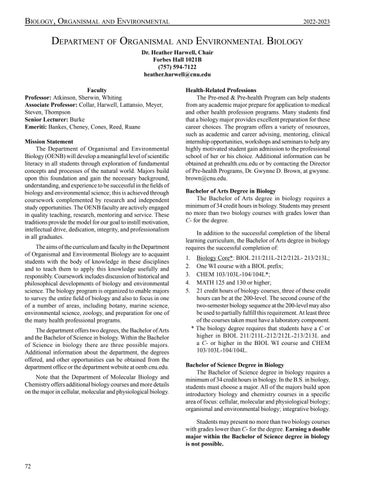BIOLOGY, ORGANISMAL AND ENVIRONMENTAL
2022-2023
DEPARTMENT OF ORGANISMAL AND ENVIRONMENTAL BIOLOGY Dr. Heather Harwell, Chair Forbes Hall 1021B (757) 594-7122 heather.harwell@cnu.edu Faculty Professor: Atkinson, Sherwin, Whiting Associate Professor: Collar, Harwell, Lattansio, Meyer, Steven, Thompson Senior Lecturer: Burke Emeriti: Bankes, Cheney, Cones, Reed, Ruane Mission Statement The Department of Organismal and Environmental Biology (OENB) will develop a meaningful level of scientific literacy in all students through exploration of fundamental concepts and processes of the natural world. Majors build upon this foundation and gain the necessary background, understanding, and experience to be successful in the fields of biology and environmental science; this is achieved through coursework complemented by research and independent study opportunities. The OENB faculty are actively engaged in quality teaching, research, mentoring and service. These traditions provide the model for our goal to instill motivation, intellectual drive, dedication, integrity, and professionalism in all graduates. The aims of the curriculum and faculty in the Department of Organismal and Environmental Biology are to acquaint students with the body of knowledge in these disciplines and to teach them to apply this knowledge usefully and responsibly. Coursework includes discussion of historical and philosophical developments of biology and environmental science. The biology program is organized to enable majors to survey the entire field of biology and also to focus in one of a number of areas, including botany, marine science, environmental science, zoology, and preparation for one of the many health professional programs. The department offers two degrees, the Bachelor of Arts and the Bachelor of Science in biology. Within the Bachelor of Science in biology there are three possible majors. Additional information about the department, the degrees offered, and other opportunities can be obtained from the department office or the department website at oenb.cnu.edu. Note that the Department of Molecular Biology and Chemistry offers additional biology courses and more details on the major in cellular, molecular and physiological biology.
Health-Related Professions The Pre-med & Pre-health Program can help students from any academic major prepare for application to medical and other health profession programs. Many students find that a biology major provides excellent preparation for these career choices. The program offers a variety of resources, such as academic and career advising, mentoring, clinical internship opportunities, workshops and seminars to help any highly motivated student gain admission to the professional school of her or his choice. Additional information can be obtained at prehealth.cnu.edu or by contacting the Director of Pre-health Programs, Dr. Gwynne D. Brown, at gwynne. brown@cnu.edu. Bachelor of Arts Degree in Biology The Bachelor of Arts degree in biology requires a minimum of 34 credit hours in biology. Students may present no more than two biology courses with grades lower than C- for the degree. In addition to the successful completion of the liberal learning curriculum, the Bachelor of Arts degree in biology requires the successful completion of: 1. 2. 3. 4. 5.
Biology Core*: BIOL 211/211L-212/212L- 213/213L; One WI course with a BIOL prefix; CHEM 103/103L-104/104L*; MATH 125 and 130 or higher; 21 credit hours of biology courses, three of these credit hours can be at the 200-level. The second course of the two-semester biology sequence at the 200-level may also be used to partially fulfill this requirement. At least three of the courses taken must have a laboratory component. * The biology degree requires that students have a C or higher in BIOL 211/211L-212/212L-213/213L and a C- or higher in the BIOL WI course and CHEM 103/103L-104/104L.
Bachelor of Science Degree in Biology The Bachelor of Science degree in biology requires a minimum of 34 credit hours in biology. In the B.S. in biology, students must choose a major. All of the majors build upon introductory biology and chemistry courses in a specific area of focus: cellular, molecular and physiological biology; organismal and environmental biology; integrative biology. Students may present no more than two biology courses with grades lower than C- for the degree. Earning a double major within the Bachelor of Science degree in biology is not possible.
72
